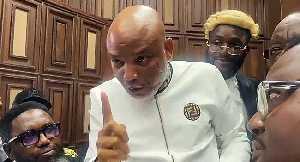The Indigenous People of Biafra (IPOB) has announced plans to publicly scrutinise and criticise a recent judicial ruling by Justice James Omotosho of the Federal High Court in Abuja.
IPOB asserted that the ruling contains fundamental legal defects, contradictions, and illegality, which they intend to expose in the coming days and weeks.
The group emphasised that Mazi Nnamdi Kanu, their leader, was never found in possession of weapons such as guns, grenades, GPMGs, explosives, or any attack plans. No witness, civilian or military, has testified to any offence committed by Kanu under Nigerian or international law, a claim IPOB presents as an undeniable fact.
IPOB reiterated that the only "offence" attributed to Kanu is his pursuit of self-determination—a right protected by multiple international agreements, including Article 20 of the African Charter on Human and Peoples’ Rights, Article 1 of the International Covenant on Civil and Political Rights, and Article 1 of the International Covenant on Economic, Social and Cultural Rights. The group stresses that self-determination is a protected right and not a crime. They argue that agitation for independence or referendum is legitimate and not synonymous with terrorism.
The organisation also alleged that during Kanu’s detention in solitary confinement at the Department of State Services (DSS) facility, Nigerian security forces escalated insecurity in the South-East, attacking Kanu and IPOB members. IPOB claims that Kanu was attacked by the Nigerian military during Operation Python Dance, and members of the IPOB family have been massacred in various locations, including Nkpor, Aba, Onitsha, and Emene. They criticise the Nigerian government for failing to hold any officers accountable for these atrocities, yet now seeking to convict Kanu—whom they regard as a victim.
A critical point raised by IPOB concerns Justice Omotosho’s ruling, which they say is impossible under the law. According to the group, Omotosho either cannot or refuses to interpret Section 36(12) of the 1999 Nigerian Constitution, which clearly states that "a person shall not be convicted of a criminal offence unless that offence is defined and the penalty therefor is prescribed in a written law." IPOB questions what written law Omotosho relied on to convict Kanu, whether such law still exists, and if it has been repealed, how it can form the basis of a conviction.
IPOB vowed to scrutinise and expose every detail of the ruling, condemning what they see as judicial malpractice. They argued that Nigeria’s judiciary must uphold constitutional and international legal standards, warning that recent actions threaten the rule of law. The group insisted this is no longer merely a Biafra issue but a broader human rights, constitutional, and international law concern, testing Nigeria’s commitment to justice and the rule of law.
ASA
General News of Friday, 21 November 2025
Source: www.mynigeria.com













